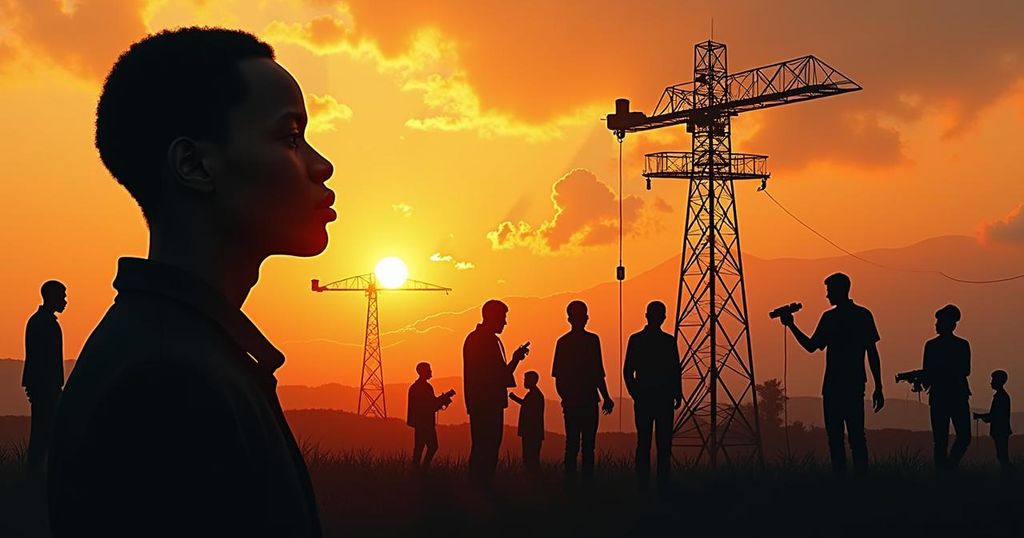Murder of Radio Maria Coordinator Highlights Dangers for Journalists in Eastern DR Congo

Edmond Bahati Monja, coordinator of Radio Maria/Goma, was murdered by armed men near his home in Goma on September 27. His death marks another tragic incident in a region plagued by violence, particularly against journalists who report on armed group activities. Despite a state of siege declared by authorities, violent crime remains rampant, necessitating urgent attention to the safety of the press and civilian populations in North Kivu.
Edmond Bahati Monja, the coordinator for Radio Maria/Goma, was tragically murdered on the evening of September 27. Armed assailants shot him near his residence in the Ndosho district, located on the outskirts of Goma, the capital city of North Kivu in the Democratic Republic of Congo. This area has been marred by violence due to the presence of the M23 armed movement. As Goma faces encirclement by M23 militants, the Congolese army has sought to bolster the city’s defenses through alliances with other armed factions, including local militias known as Wazalendo, or “Patriots” in Swahili. Nevertheless, the proliferation of these irregular groups has corresponded with a surge in violent crime, including robbery and murder. The assassination of Bahati, particularly given his journalism that highlighted ongoing violence perpetrated by armed groups, underscores the peril that journalists face in this region. Over the past two years, at least a dozen journalists have been murdered in and around Goma. Eyewitness accounts suggested that Bahati was pursued by three armed men, possibly dressed in military uniforms, who had robbed another individual shortly before the murder took place. He was shot multiple times at close range and leaves behind a grieving family, including his wife and three children. One Radio Maria employee expressed, “Edmond was a man of peace who put himself at the service of the community and the Church. His death is a great loss.” Journalists in Goma are under constant threat, receiving harassing communications via phone or text. Community radio stations such as Radio Maria/Goma play a vital role in disseminating information amid crisis conditions, yet they are often viewed as problematic by various factions due to their commitment to reporting on violence against civilian populations. Residents worry as the violent climate persists despite a state of siege in North Kivu and the neighboring Ituri province, which was declared by the government on May 6, 2021. The Congolese army’s reliance on armed groups to challenge the M23 has fostered further insecurity. In a related statement, Cardinal Fridolin Ambongo Besungu, the Metropolitan Archbishop of Kinshasa, warned of the impending threat these armed groups pose to innocent civilians, stating that they are involved in looting, robberies, murders, and the illicit mineral trade from local artisanal mines. This disturbing trend highlights the critical need for enhanced protections for journalists and the civilian population in North Kivu amidst escalating violence and instability.
The Democratic Republic of Congo’s eastern province of North Kivu, specifically the city of Goma, has become a hotspot for violence due to the ongoing conflict involving various armed groups, notably the M23 movement. The region has a history of instability and is marked by the frequent occurrence of violent crime, threats against journalists, and a response from the Congolese army that has often involved partnerships with local militias. Despite the declaration of a state of siege aimed at restoring order, the security situation has continuously deteriorated, prompting concern from local populations and international observers alike. Journalists like Edmond Bahati Monja play a vital role in documenting these conflicts, yet face severe risks in performing their duties, leading to a tragic history of targeted attacks against members of the press in this area.
The murder of Edmond Bahati is a stark reminder of the dangers faced by journalists operating in conflict zones such as Goma, where the interplay between armed groups and the military further exacerbates violence against civilians. As the region grapples with ongoing insecurity, the need for effective safeguarding measures for journalists becomes paramount. The loss of Bahati, a dedicated community servant, is deeply felt within the local and broader humanitarian framework, emphasizing the dire situation facing many in North Kivu amidst continuous armed conflict.
Original Source: www.fides.org







